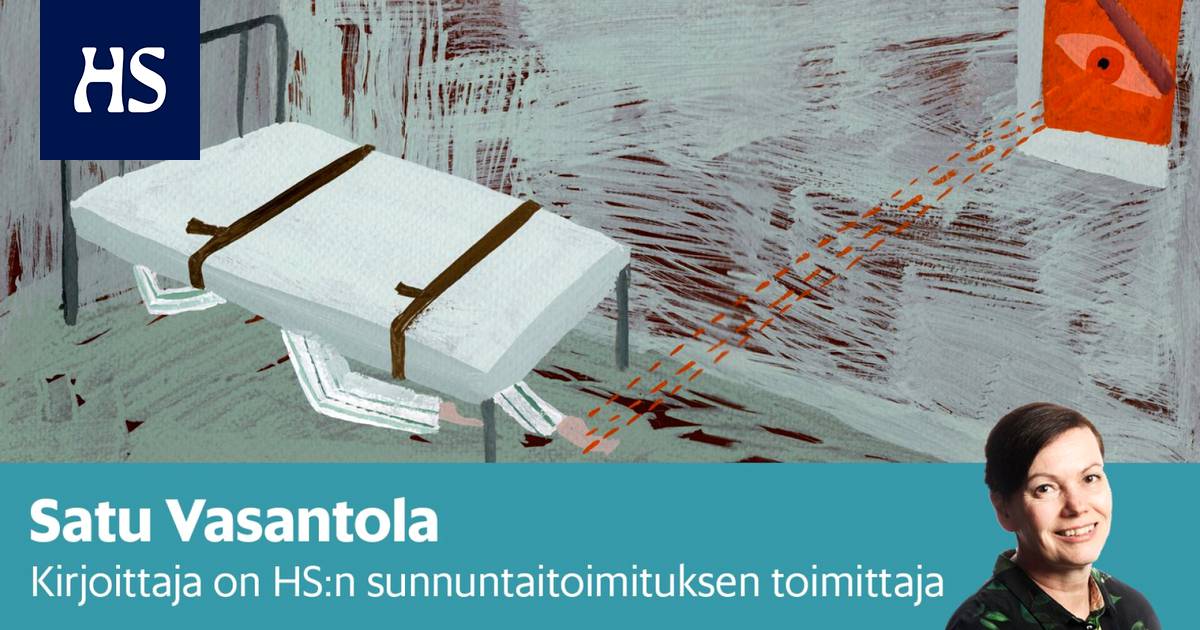Closed at the door of the department the soundscape changes. Inside the ward, keychains squeak to the pace of the nurses ’steps. I remember those sounds carefully, for I have heard them many times when I have visited my relatives.
I have referred him to involuntary treatment often. Sometimes the police have been needed to help when a manic and delusional person has not realized that he is ill but has believed that he is being chased by a murderous league.
There are conflicting thoughts associated with those moments. Do I have the right to deliver another person behind bars? How does it feel for a person who otherwise feels persecuted? Why does he think I’m a murderer? Why didn’t we get help before?
At the same time, the doors of the closed compartment bring relief. When the lock snaps behind my back, I know that for the next few weeks, he will be calm and his relative safe, his mind leveling.
So if it goes so well that the patient gets to the hospital.
Early summer it is often a difficult time for us, for mania begins to increase as the light begins to begin. First come the little tips. Speech is accelerating, swearing is increasing, gambling is tempting.
Then there is the rush, as there is only a couple of weeks to go from the first signs to psychosis.
If medication was prescribed in a timely manner, paranoia, incidents, and prolonged involuntary treatment could likely be avoided. But that’s when the doors close in front of us.
“It doesn’t look bad yet,” the doctor said on duty. “But when I, as a professional, don’t see the signs,” it was stated one other time.
Thus, medication is not prescribed.
It doesn’t help, even if the sick person says he noticed the mania rising. And it doesn’t help, even though we relatives assure us that we recognize the signs of the disease.
Treatment is only available when the situation is impossible. And not always.
Venla Kuoppamäki fresh nonfiction Sun’s son visited here tells the story of Kuoppamäki’s boy in his twenties. Patient with bipolar disorder Oscar ended up manic several times in a closed department. Many times he escaped from there as soon as he received a permit to go out.
Therefore, Kuoppamäki requested that permission not be granted until the delusions had disappeared. Permission was still given, and Oscar escaped. For on his escape he also died.
As he read the book, he cried and was angry.
My purpose there are no barking doctors or nurses. I have met great professionals over the decades. That, too, is an experienced and gentle nurse at the Hus Psychiatric Center, who asked if monitoring your illness had really been the responsibility of your relatives all these years. And then arranged for my relatives to be admitted to outpatient care for the first time.
I think of this caregiver with warmth often. But getting treatment shouldn’t depend on whether you happen to see a tired or devoted professional. There is always both, and the system still needs to work.
Of course, a lot has been done. Suicides have been reduced. Rehabilitation psychotherapy replaced by Kela is now easier to obtain than ten years ago.
But the most severely ill are too often thrown away or relied on by tired relatives. It is also the case that the poor are significantly more likely to end up in psychiatric hospital care than the well-off.
“The lower the annual income, the higher the probability of first psychiatric hospitalization,” wrote a professor of social psychiatry Sami Pirkola In the medical journal a couple of years ago.
The causes and consequences are undoubtedly complex, but this is a rather cold fact.
So long As I recall, there has been talk in Finland of the need for more doctors and nurses in healthcare. This can be the case, and in psychiatry this is guaranteed.
Some of the problems could still be solved by other means, even easily and cheaply. Surgery, for example, has succeeded in preventing treatment errors and saving lives in a simple way. There is, however, a complex story behind the insight.
In the fall of 1935, the U.S. Air Force was choosing a new bomber model. A pre-favorite was a Boeing plane, which, however, crashed to the ground on a demonstration flight in the middle of takeoff. Of the five crew members, two died.
No technical fault was found in the aircraft and the pilot had experienced it. However, he had forgotten to unlock the machine’s control surfaces, making the machine unmanageable.
After the accident, Boeing wondered how security could be improved while preventing the company from going bankrupt. Pilots come up with a simple solution: a checklist. It would include all the things that needed to be checked before take-off, even the most obvious ones.
Decades later, checklists were also introduced in surgery. Are the patient’s medications and allergies confirmed? And which hand or foot is being cut?
Surgeon and a professor of medicine at Harvard University Atul Gawande is one of the fathers of checklists. A few years ago he wrote a book on death and to that end interviewed two hundred patients approaching death and their families.
The doctrine of the interviews was also simple: people didn’t talk about death but about life before.
As doctors focus on fighting their patients as much extra time as possible, they also forget to ask what the person wants from their lives. One wants to teach piano, the other eats ice cream and watches football.
I would believe that the mentally ill have one common wish: to survive without involuntary treatment. In that, we relatives could help if we were listened to in time.
#Columns #professional #dont #signs #doctor #call #dont #sick #person #relatives #needed

/s3/static.nrc.nl/wp-content/uploads/2024/04/web-2604buicharles.jpg)







